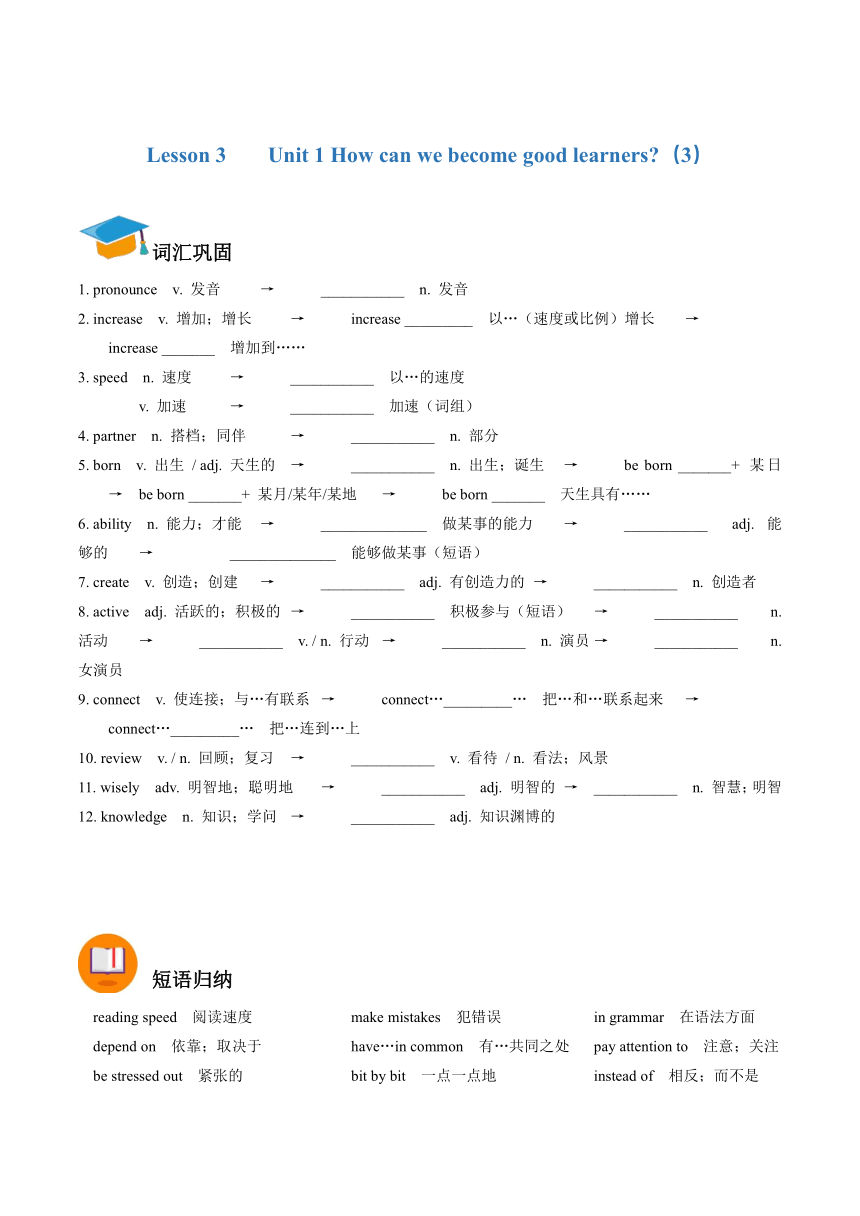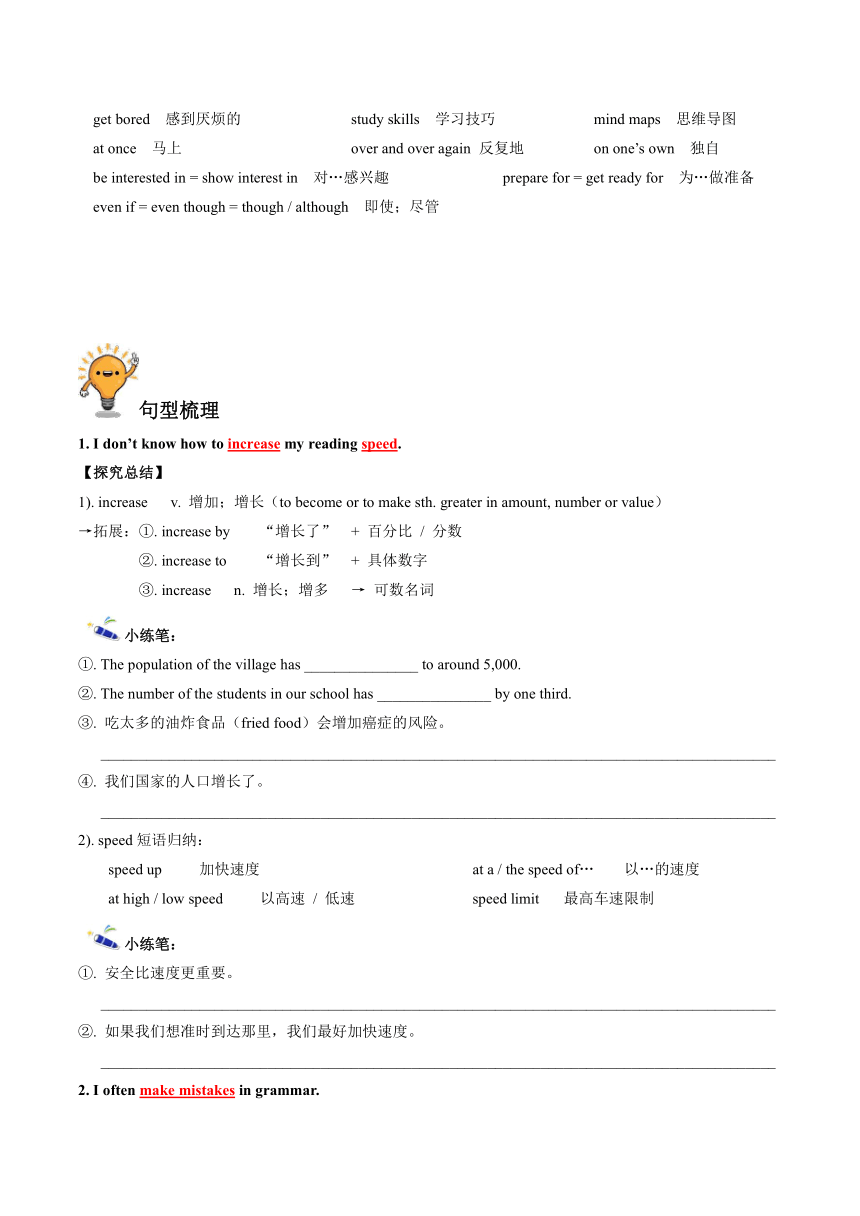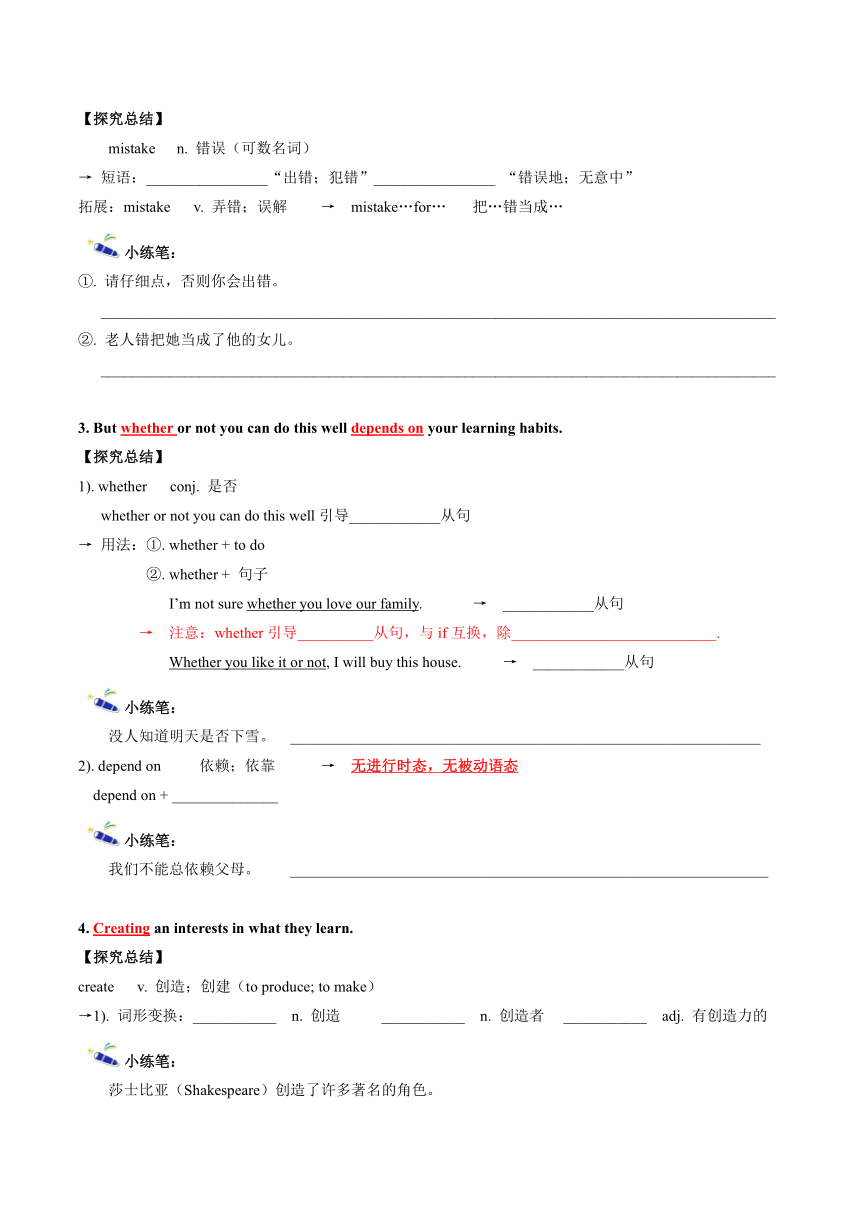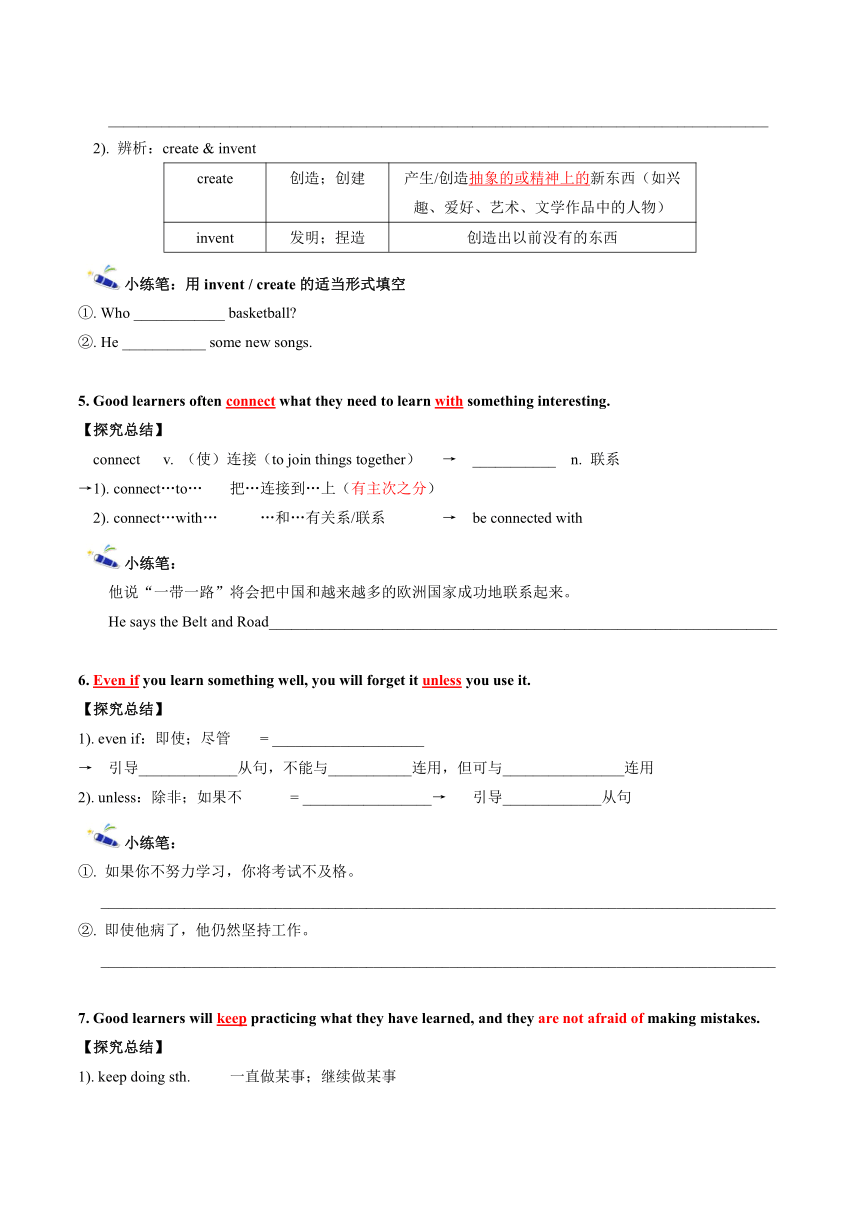Unit 1 How can we become good learners?(3) 知识清单及习题(无答案)2023-2024学年人教版九年级英语全册
文档属性
| 名称 | Unit 1 How can we become good learners?(3) 知识清单及习题(无答案)2023-2024学年人教版九年级英语全册 |  | |
| 格式 | docx | ||
| 文件大小 | 97.8KB | ||
| 资源类型 | 教案 | ||
| 版本资源 | 人教新目标(Go for it)版 | ||
| 科目 | 英语 | ||
| 更新时间 | 2024-07-13 16:52:05 | ||
图片预览




文档简介
Lesson 3 Unit 1 How can we become good learners (3)
词汇巩固
1. pronounce v. 发音 → ___________ n. 发音
2. increase v. 增加;增长 → increase _________ 以…(速度或比例)增长 → increase _______ 增加到……
3. speed n. 速度 → ___________ 以…的速度
v. 加速 → ___________ 加速(词组)
4. partner n. 搭档;同伴 → ___________ n. 部分
5. born v. 出生 / adj. 天生的 → ___________ n. 出生;诞生 → be born _______+ 某日 → be born _______+ 某月/某年/某地 → be born _______ 天生具有……
6. ability n. 能力;才能 → ______________ 做某事的能力 → ___________ adj. 能够的 → ______________ 能够做某事(短语)
7. create v. 创造;创建 → ___________ adj. 有创造力的 → ___________ n. 创造者
8. active adj. 活跃的;积极的 → ___________ 积极参与(短语) → ___________ n. 活动 → ___________ v. / n. 行动 → ___________ n. 演员 → ___________ n. 女演员
9. connect v. 使连接;与…有联系 → connect…_________… 把…和…联系起来 → connect…_________… 把…连到…上
10. review v. / n. 回顾;复习 → ___________ v. 看待 / n. 看法;风景
11. wisely adv. 明智地;聪明地 → ___________ adj. 明智的 → ___________ n. 智慧;明智
12. knowledge n. 知识;学问 → ___________ adj. 知识渊博的
短语归纳
reading speed 阅读速度 make mistakes 犯错误 in grammar 在语法方面
depend on 依靠;取决于 have…in common 有…共同之处 pay attention to 注意;关注
be stressed out 紧张的 bit by bit 一点一点地 instead of 相反;而不是
get bored 感到厌烦的 study skills 学习技巧 mind maps 思维导图
at once 马上 over and over again 反复地 on one’s own 独自
be interested in = show interest in 对…感兴趣 prepare for = get ready for 为…做准备
even if = even though = though / although 即使;尽管
句型梳理
1. I don’t know how to increase my reading speed.
【探究总结】
1). increase v. 增加;增长(to become or to make sth. greater in amount, number or value)
→拓展:①. increase by “增长了” + 百分比 / 分数
②. increase to “增长到” + 具体数字
③. increase n. 增长;增多 → 可数名词
小练笔:
①. The population of the village has _______________ to around 5,000.
②. The number of the students in our school has _______________ by one third.
③. 吃太多的油炸食品(fried food)会增加癌症的风险。
_________________________________________________________________________________________
④. 我们国家的人口增长了。
_________________________________________________________________________________________
2). speed短语归纳:
speed up 加快速度 at a / the speed of… 以…的速度
at high / low speed 以高速 / 低速 speed limit 最高车速限制
小练笔:
①. 安全比速度更重要。
_________________________________________________________________________________________
②. 如果我们想准时到达那里,我们最好加快速度。
_________________________________________________________________________________________
2. I often make mistakes in grammar.
【探究总结】
mistake n. 错误(可数名词)
→ 短语:________________“出错;犯错”________________ “错误地;无意中”
拓展:mistake v. 弄错;误解 → mistake…for… 把…错当成…
小练笔:
①. 请仔细点,否则你会出错。
_________________________________________________________________________________________
②. 老人错把她当成了他的女儿。
_________________________________________________________________________________________
3. But whether or not you can do this well depends on your learning habits.
【探究总结】
1). whether conj. 是否
whether or not you can do this well引导____________从句
→ 用法:①. whether + to do
②. whether + 句子
I’m not sure whether you love our family. → ____________从句
→ 注意:whether引导__________从句,与if互换,除___________________________.
Whether you like it or not, I will buy this house. → ____________从句
小练笔:
没人知道明天是否下雪。 ______________________________________________________________
2). depend on 依赖;依靠 → 无进行时态,无被动语态
depend on + ______________
小练笔:
我们不能总依赖父母。 _______________________________________________________________
4. Creating an interests in what they learn.
【探究总结】
create v. 创造;创建(to produce; to make)
→1). 词形变换:___________ n. 创造 ___________ n. 创造者 ___________ adj. 有创造力的
小练笔:
莎士比亚(Shakespeare)创造了许多著名的角色。
_______________________________________________________________________________________
2). 辨析:create & invent
create 创造;创建 产生/创造抽象的或精神上的新东西(如兴趣、爱好、艺术、文学作品中的人物)
invent 发明;捏造 创造出以前没有的东西
小练笔:用invent / create的适当形式填空
①. Who ____________ basketball
②. He ___________ some new songs.
5. Good learners often connect what they need to learn with something interesting.
【探究总结】
connect v. (使)连接(to join things together) → ___________ n. 联系
→1). connect…to… 把…连接到…上(有主次之分)
2). connect…with… …和…有关系/联系 → be connected with
小练笔:
他说“一带一路”将会把中国和越来越多的欧洲国家成功地联系起来。
He says the Belt and Road___________________________________________________________________
6. Even if you learn something well, you will forget it unless you use it.
【探究总结】
1). even if:即使;尽管 = ____________________
→ 引导_____________从句,不能与___________连用,但可与________________连用
2). unless:除非;如果不 = _________________→ 引导_____________从句
小练笔:
①. 如果你不努力学习,你将考试不及格。
_________________________________________________________________________________________
②. 即使他病了,他仍然坚持工作。
_________________________________________________________________________________________
7. Good learners will keep practicing what they have learned, and they are not afraid of making mistakes.
【探究总结】
1). keep doing sth. 一直做某事;继续做某事
→ keep用法:①. keep on doing sth. 反复做某事
②. keep sb. from doing sth. 阻止某人做某事
③. keep (+ sb. / sth.) + adj. 保持(某人/某物)…
小练笔:
①. 坚持学习,你就会成功。
_________________________________________________________________________________________
②. 大雪阻止我们向前进。
_________________________________________________________________________________________
③. 每天我们必须保持教室干净。
_________________________________________________________________________________________
2). be afraid of + doing sth. = be afraid to do sth. 害怕做某事
be afraid of + sb. / sth. 害怕某人/某物
8. They also look for ways to review what they have learned.
【探究总结】
1). review:v. 复习(consider or examine again)
→ 构词法:re-(再一次) + view
__________ v. 重写 __________ v. 回首 __________ v. 重新开始
小练笔:
温故而知新。
_________________________________________________________________________________________
2). 拓展:review n. 复习;回顾;评论
________________ 对她的书的评论 ___________________ 对一年的回顾
9. Knowledge comes from questioning.
【探究总结】
knowledge:n. 知识;学问(不可数名词) → ___________ adj. 知识渊博的 → ___________ adv. 有见识地
→ 用法:have a knowledge of / about… 有…方面的知识
小练笔:
知识就是力量。 ________________________________________________________________________
10. Everything that you learn becomes a part of you and changes you, so learn wisely and learn well.
【探究总结】
1). that you learn → 由that引导的_____________从句,that在句中作_______________成分
2). wisely词性巩固
____________ adj. 明智的 _____________ n. 智慧;才智
小练笔:
生命是一种馈赠,所以要明智地使用它。
________________________________________________________________________________________
11. Try to study and remember information bit by bit instead of waiting until the last minute to study everything at once.
【探究总结】
1). instead of:相反;而不是 + ______________ = rather than / take one’s place
小练笔:
①. He played computer instead of doing his homework.
= _________________________________________________________________________________________
②. I attend the meeting instead of Mr. Green.
= _________________________________________________________________________________________
2). Review: instead adv. 相反 → 常位于句首(常用逗号隔开)或句尾
小练笔:
她没有去睡觉,反而去看电视了。
________________________________________________________________________________________
Exercise
一、根据句意,用合适的词完成句子,每空限填一词
1. We often learn English words __________ making word cards.
2. What’s the secret __________ success
3. I have to study __________ tomorrow’s chemistry exam.
4. Do you think working __________ a group is a good way to learn
5. We should have conversations __________ English to practice speaking skills.
6. What __________ doing grammar exercises
7. Don’t worry about the new words. We can guess them through the words __________ and after them.
8. I was so tired __________ I couldn’t walk any longer.
9. I like to take down the useful sentences __________ “It serves you right”.
10. Don’t read word __________ word when you read a book. Read word groups.
二、根据句意和首字母提示完成句中单词
1. He usually learns English by doing more English e__________.
2. You should be p__________ to deal with the problems created by young kids. It needs time.
3. Listening to a tape and r__________ out loud is a good way to improve your listening.
4. Do you learn English by reading a__________
5. There was no e__________ on the woman’s face when she heard it.
6. Of all my subjects, I like p__________ and chemistry best. I want to be a scientist.
7. I improve my writing by writing e-mail to my pen p__________.
8. You can practice your English by m__________ sentence patterns. It’s good for your writing.
9. Taking n__________ is helpful for you to learn English grammar.
10. S__________ written in English begin with a big letter and usually end with a full stop or a question mark.
三、用所给词的适当形式填空
1. I don’t get _______________(many) speaking practice.
2. —Can you tell me how to _______________(pronunciation) the word —Sure.
3. It’s not easy for me _______________(understand) the native speakers if they speak too fast.
4. The writer used _______________(conversation) between the characters to go on the story.
5. In order to get good grades, you need _______________(improve) your study skills.
6. He is a man of many _______________(ability).
7. That was not _______________(wise) done.
8. The population of the earth _______________(increase) very fast.
9. I don’t think it difficult to keep _______________(read) English every morning.
10. Get students’ attention by _______________(repeat) what you said.
11. I usually practice my English by memorizing sentence _______________(pattern).
12. He answered my questions in _______________(chemistry) class.
13. She finally _______________(memorize) the poem.
Homework
一、写出画线单词的词性和词义
1. I practice basketball every day. _______________
2. Why not get some reading practice _______________
3. The headmaster doesn’t allow anyone to challenge his authority(权威). _______________
4. Don’t be afraid to face any challenges. _______________
5. The nurse is busy looking after the patients. _______________
6. You must be patient. It takes time. _______________
7. Please keep it secret. _______________
8. Everybody has a secret. _______________
9. The band’s new album has had very good reviews. _______________
10. My attention wasn’t really on the game. _______________
二、用合适的词填空
1. Good learners often connect what they need to learn __________ something they are interested __________.
2. __________ if you learn something well, you will forget it __________ use it.
3. Good learners are also afraid __________ making mistakes.
4. He succeed __________ trying many times and learning __________ his mistakes.
5. They may take notes by writing __________ key words __________ by drawing mind maps.
6. Jim often makes mistakes _______________ spelling.
7. He can’t always understand them _______________ people talk to him.
8. I don’t have a good friend to play _______________.
9. Sam usually writes _______________ the new words and reads them from time to time.
10. The other problem is _______________ I have no time to practice after school.
11. —You could join a club to practice your spoken English.
—That sounds _______________ a good idea. Thanks.
12. Students often look _______________ the new words on the Internet.
13. —Does anyone learn to play soccer _______________ just talking with others —Impossible.
三、语法填空
Reading for pleasure is the easiest way to become a better reader in English. It is also _______1________(important) way.
Some students say they don’t want to read ________2_______ pleasure. They say they want to use their time to learn the rules of the language and new words. They say that pleasure reading ________3_______(be) too easy.
Many experts say pleasure reading is very important for learning English. Dr. Stephen Krashen, a famous expert on _______4________(learn) languages, says that pleasure reading helps you learn many important things about English. Students learn more grammar and more words _______5________ they read for pleasure. They also learn more about good writing.
Dr. Krashen _______6________(tell) us that pleasure reading helps each student in a different way. Each student needs to learn something different. Pleasure reading makes it possible for each student to learn _______7________ he or she needs.
Reading for pleasure is not the same ______8_________ studying. When you read for pleasure, you choose your own books, and you don’t have to remember everything. There are no tests on your pleasure reading. Pleasure reading will help you:
●learn how English speakers use English.
●read ______9________ (fast) in English than before.
●find examples of good writing in English.
●learn new words.
●learn about _______10_______ culture of English speakers.
四、中译英
1. 我需要提高我的英语口语水平。
_________________________________________________________________________________________
2. 我发现努力工作是幸福的秘诀。
_________________________________________________________________________________________
3. 我因为英语口语不好而害怕和外教交谈。
_________________________________________________________________________________________
4. 只要是正确的事,我都会尽力去做。
_________________________________________________________________________________________
5. Candy通过看书练习烹饪,知道她能煮可口的食物。
_________________________________________________________________________________________
词汇巩固
1. pronounce v. 发音 → ___________ n. 发音
2. increase v. 增加;增长 → increase _________ 以…(速度或比例)增长 → increase _______ 增加到……
3. speed n. 速度 → ___________ 以…的速度
v. 加速 → ___________ 加速(词组)
4. partner n. 搭档;同伴 → ___________ n. 部分
5. born v. 出生 / adj. 天生的 → ___________ n. 出生;诞生 → be born _______+ 某日 → be born _______+ 某月/某年/某地 → be born _______ 天生具有……
6. ability n. 能力;才能 → ______________ 做某事的能力 → ___________ adj. 能够的 → ______________ 能够做某事(短语)
7. create v. 创造;创建 → ___________ adj. 有创造力的 → ___________ n. 创造者
8. active adj. 活跃的;积极的 → ___________ 积极参与(短语) → ___________ n. 活动 → ___________ v. / n. 行动 → ___________ n. 演员 → ___________ n. 女演员
9. connect v. 使连接;与…有联系 → connect…_________… 把…和…联系起来 → connect…_________… 把…连到…上
10. review v. / n. 回顾;复习 → ___________ v. 看待 / n. 看法;风景
11. wisely adv. 明智地;聪明地 → ___________ adj. 明智的 → ___________ n. 智慧;明智
12. knowledge n. 知识;学问 → ___________ adj. 知识渊博的
短语归纳
reading speed 阅读速度 make mistakes 犯错误 in grammar 在语法方面
depend on 依靠;取决于 have…in common 有…共同之处 pay attention to 注意;关注
be stressed out 紧张的 bit by bit 一点一点地 instead of 相反;而不是
get bored 感到厌烦的 study skills 学习技巧 mind maps 思维导图
at once 马上 over and over again 反复地 on one’s own 独自
be interested in = show interest in 对…感兴趣 prepare for = get ready for 为…做准备
even if = even though = though / although 即使;尽管
句型梳理
1. I don’t know how to increase my reading speed.
【探究总结】
1). increase v. 增加;增长(to become or to make sth. greater in amount, number or value)
→拓展:①. increase by “增长了” + 百分比 / 分数
②. increase to “增长到” + 具体数字
③. increase n. 增长;增多 → 可数名词
小练笔:
①. The population of the village has _______________ to around 5,000.
②. The number of the students in our school has _______________ by one third.
③. 吃太多的油炸食品(fried food)会增加癌症的风险。
_________________________________________________________________________________________
④. 我们国家的人口增长了。
_________________________________________________________________________________________
2). speed短语归纳:
speed up 加快速度 at a / the speed of… 以…的速度
at high / low speed 以高速 / 低速 speed limit 最高车速限制
小练笔:
①. 安全比速度更重要。
_________________________________________________________________________________________
②. 如果我们想准时到达那里,我们最好加快速度。
_________________________________________________________________________________________
2. I often make mistakes in grammar.
【探究总结】
mistake n. 错误(可数名词)
→ 短语:________________“出错;犯错”________________ “错误地;无意中”
拓展:mistake v. 弄错;误解 → mistake…for… 把…错当成…
小练笔:
①. 请仔细点,否则你会出错。
_________________________________________________________________________________________
②. 老人错把她当成了他的女儿。
_________________________________________________________________________________________
3. But whether or not you can do this well depends on your learning habits.
【探究总结】
1). whether conj. 是否
whether or not you can do this well引导____________从句
→ 用法:①. whether + to do
②. whether + 句子
I’m not sure whether you love our family. → ____________从句
→ 注意:whether引导__________从句,与if互换,除___________________________.
Whether you like it or not, I will buy this house. → ____________从句
小练笔:
没人知道明天是否下雪。 ______________________________________________________________
2). depend on 依赖;依靠 → 无进行时态,无被动语态
depend on + ______________
小练笔:
我们不能总依赖父母。 _______________________________________________________________
4. Creating an interests in what they learn.
【探究总结】
create v. 创造;创建(to produce; to make)
→1). 词形变换:___________ n. 创造 ___________ n. 创造者 ___________ adj. 有创造力的
小练笔:
莎士比亚(Shakespeare)创造了许多著名的角色。
_______________________________________________________________________________________
2). 辨析:create & invent
create 创造;创建 产生/创造抽象的或精神上的新东西(如兴趣、爱好、艺术、文学作品中的人物)
invent 发明;捏造 创造出以前没有的东西
小练笔:用invent / create的适当形式填空
①. Who ____________ basketball
②. He ___________ some new songs.
5. Good learners often connect what they need to learn with something interesting.
【探究总结】
connect v. (使)连接(to join things together) → ___________ n. 联系
→1). connect…to… 把…连接到…上(有主次之分)
2). connect…with… …和…有关系/联系 → be connected with
小练笔:
他说“一带一路”将会把中国和越来越多的欧洲国家成功地联系起来。
He says the Belt and Road___________________________________________________________________
6. Even if you learn something well, you will forget it unless you use it.
【探究总结】
1). even if:即使;尽管 = ____________________
→ 引导_____________从句,不能与___________连用,但可与________________连用
2). unless:除非;如果不 = _________________→ 引导_____________从句
小练笔:
①. 如果你不努力学习,你将考试不及格。
_________________________________________________________________________________________
②. 即使他病了,他仍然坚持工作。
_________________________________________________________________________________________
7. Good learners will keep practicing what they have learned, and they are not afraid of making mistakes.
【探究总结】
1). keep doing sth. 一直做某事;继续做某事
→ keep用法:①. keep on doing sth. 反复做某事
②. keep sb. from doing sth. 阻止某人做某事
③. keep (+ sb. / sth.) + adj. 保持(某人/某物)…
小练笔:
①. 坚持学习,你就会成功。
_________________________________________________________________________________________
②. 大雪阻止我们向前进。
_________________________________________________________________________________________
③. 每天我们必须保持教室干净。
_________________________________________________________________________________________
2). be afraid of + doing sth. = be afraid to do sth. 害怕做某事
be afraid of + sb. / sth. 害怕某人/某物
8. They also look for ways to review what they have learned.
【探究总结】
1). review:v. 复习(consider or examine again)
→ 构词法:re-(再一次) + view
__________ v. 重写 __________ v. 回首 __________ v. 重新开始
小练笔:
温故而知新。
_________________________________________________________________________________________
2). 拓展:review n. 复习;回顾;评论
________________ 对她的书的评论 ___________________ 对一年的回顾
9. Knowledge comes from questioning.
【探究总结】
knowledge:n. 知识;学问(不可数名词) → ___________ adj. 知识渊博的 → ___________ adv. 有见识地
→ 用法:have a knowledge of / about… 有…方面的知识
小练笔:
知识就是力量。 ________________________________________________________________________
10. Everything that you learn becomes a part of you and changes you, so learn wisely and learn well.
【探究总结】
1). that you learn → 由that引导的_____________从句,that在句中作_______________成分
2). wisely词性巩固
____________ adj. 明智的 _____________ n. 智慧;才智
小练笔:
生命是一种馈赠,所以要明智地使用它。
________________________________________________________________________________________
11. Try to study and remember information bit by bit instead of waiting until the last minute to study everything at once.
【探究总结】
1). instead of:相反;而不是 + ______________ = rather than / take one’s place
小练笔:
①. He played computer instead of doing his homework.
= _________________________________________________________________________________________
②. I attend the meeting instead of Mr. Green.
= _________________________________________________________________________________________
2). Review: instead adv. 相反 → 常位于句首(常用逗号隔开)或句尾
小练笔:
她没有去睡觉,反而去看电视了。
________________________________________________________________________________________
Exercise
一、根据句意,用合适的词完成句子,每空限填一词
1. We often learn English words __________ making word cards.
2. What’s the secret __________ success
3. I have to study __________ tomorrow’s chemistry exam.
4. Do you think working __________ a group is a good way to learn
5. We should have conversations __________ English to practice speaking skills.
6. What __________ doing grammar exercises
7. Don’t worry about the new words. We can guess them through the words __________ and after them.
8. I was so tired __________ I couldn’t walk any longer.
9. I like to take down the useful sentences __________ “It serves you right”.
10. Don’t read word __________ word when you read a book. Read word groups.
二、根据句意和首字母提示完成句中单词
1. He usually learns English by doing more English e__________.
2. You should be p__________ to deal with the problems created by young kids. It needs time.
3. Listening to a tape and r__________ out loud is a good way to improve your listening.
4. Do you learn English by reading a__________
5. There was no e__________ on the woman’s face when she heard it.
6. Of all my subjects, I like p__________ and chemistry best. I want to be a scientist.
7. I improve my writing by writing e-mail to my pen p__________.
8. You can practice your English by m__________ sentence patterns. It’s good for your writing.
9. Taking n__________ is helpful for you to learn English grammar.
10. S__________ written in English begin with a big letter and usually end with a full stop or a question mark.
三、用所给词的适当形式填空
1. I don’t get _______________(many) speaking practice.
2. —Can you tell me how to _______________(pronunciation) the word —Sure.
3. It’s not easy for me _______________(understand) the native speakers if they speak too fast.
4. The writer used _______________(conversation) between the characters to go on the story.
5. In order to get good grades, you need _______________(improve) your study skills.
6. He is a man of many _______________(ability).
7. That was not _______________(wise) done.
8. The population of the earth _______________(increase) very fast.
9. I don’t think it difficult to keep _______________(read) English every morning.
10. Get students’ attention by _______________(repeat) what you said.
11. I usually practice my English by memorizing sentence _______________(pattern).
12. He answered my questions in _______________(chemistry) class.
13. She finally _______________(memorize) the poem.
Homework
一、写出画线单词的词性和词义
1. I practice basketball every day. _______________
2. Why not get some reading practice _______________
3. The headmaster doesn’t allow anyone to challenge his authority(权威). _______________
4. Don’t be afraid to face any challenges. _______________
5. The nurse is busy looking after the patients. _______________
6. You must be patient. It takes time. _______________
7. Please keep it secret. _______________
8. Everybody has a secret. _______________
9. The band’s new album has had very good reviews. _______________
10. My attention wasn’t really on the game. _______________
二、用合适的词填空
1. Good learners often connect what they need to learn __________ something they are interested __________.
2. __________ if you learn something well, you will forget it __________ use it.
3. Good learners are also afraid __________ making mistakes.
4. He succeed __________ trying many times and learning __________ his mistakes.
5. They may take notes by writing __________ key words __________ by drawing mind maps.
6. Jim often makes mistakes _______________ spelling.
7. He can’t always understand them _______________ people talk to him.
8. I don’t have a good friend to play _______________.
9. Sam usually writes _______________ the new words and reads them from time to time.
10. The other problem is _______________ I have no time to practice after school.
11. —You could join a club to practice your spoken English.
—That sounds _______________ a good idea. Thanks.
12. Students often look _______________ the new words on the Internet.
13. —Does anyone learn to play soccer _______________ just talking with others —Impossible.
三、语法填空
Reading for pleasure is the easiest way to become a better reader in English. It is also _______1________(important) way.
Some students say they don’t want to read ________2_______ pleasure. They say they want to use their time to learn the rules of the language and new words. They say that pleasure reading ________3_______(be) too easy.
Many experts say pleasure reading is very important for learning English. Dr. Stephen Krashen, a famous expert on _______4________(learn) languages, says that pleasure reading helps you learn many important things about English. Students learn more grammar and more words _______5________ they read for pleasure. They also learn more about good writing.
Dr. Krashen _______6________(tell) us that pleasure reading helps each student in a different way. Each student needs to learn something different. Pleasure reading makes it possible for each student to learn _______7________ he or she needs.
Reading for pleasure is not the same ______8_________ studying. When you read for pleasure, you choose your own books, and you don’t have to remember everything. There are no tests on your pleasure reading. Pleasure reading will help you:
●learn how English speakers use English.
●read ______9________ (fast) in English than before.
●find examples of good writing in English.
●learn new words.
●learn about _______10_______ culture of English speakers.
四、中译英
1. 我需要提高我的英语口语水平。
_________________________________________________________________________________________
2. 我发现努力工作是幸福的秘诀。
_________________________________________________________________________________________
3. 我因为英语口语不好而害怕和外教交谈。
_________________________________________________________________________________________
4. 只要是正确的事,我都会尽力去做。
_________________________________________________________________________________________
5. Candy通过看书练习烹饪,知道她能煮可口的食物。
_________________________________________________________________________________________
同课章节目录
- Unit 1 How can we become good learners.
- Section A
- Section B
- Unit 2 I think that mooncakes are delicious!
- Section A
- Section B
- Unit 3 Could you please tell me where the restroom
- Section A
- Section B
- Unit 4 I used to be afraid of the dark.
- Section A
- Section B
- Unit 5 What are the shirts made of?
- Section A
- Section B
- Review of Units 1-5
- Unit 6 When was it invented?
- Section A
- Section B
- Unit 7 Teenagers should be allowed to choose their
- Section A
- Section B
- Unit 8 It must belong to Carla.
- Section A
- Section B
- Unit 9 I like music that I can dance to.
- Section A
- Section B
- Unit 10 You're supposed to shake hands.
- Section A
- Section B
- Review of Units 6-10
- Unit 11 Sad movies make me cry.
- Section A
- Section B
- Unit 12 Life is full of the unexpected
- Section A
- Section B
- Unit 13 We're trying to save the earth!
- Section A
- Section B
- Unit 14 I remember meeting all of you in Grade 7.
- Section A
- Section B
- Review of Units 11-14
